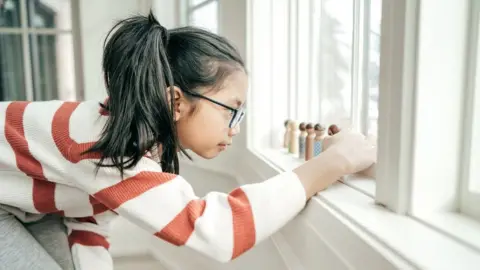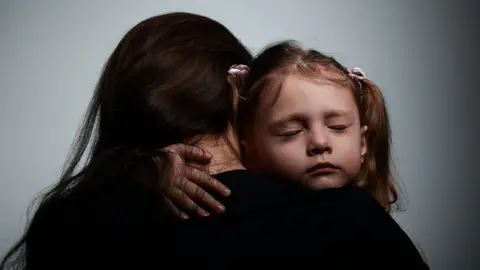Is autism being missed among women and girls?
 Getty Images
Getty Images"Lots of autistic girls and women come across as very quiet, shy and introverted," says Alis Rowe, a UK author and entrepreneur who was diagnosed with autism a few years ago.
"These quiet girls - and their problems - can be 'invisible' to other people."
Alis says she herself was not diagnosed until she was 22.
Autism spectrum disorder or ASD is a condition that affects how people communicate and interact with the world. It is estimated that 1 in 160 children worldwide has an ASD, according to data from the World Health Organization, but there is a huge disparity in diagnoses by gender.

What is Autism?
- There are around 700,000 people on the autism spectrum in the UK
- Autism is a hidden disability - you can't always tell if someone is autistic
- The term 'autism' is used to describe different conditions including Asperger syndrome and Pathological Demand Avoidance
Information from The National Autistic Society

But Carol Povey, director of the Centre for Autism within the British National Autistic Society [NAS], says there is a growing recognition that current medical tests might result in autistic girls going un-diagnosed.
Recent scientific research in the UK - specifically designed to pick up autistic characteristics in women - suggests the real ratio could be closer to 3:1. Autistic girls and women may go undiagnosed because doctors, teachers and even parents often think of the condition as primarily affecting boys, NAS says.
Also, the signs of autism in girls and women - particularly in cases of high-functioning autism - are not the same as those in boys and men: girls may have fewer restricted interests and repetitive behaviours than boys do and they may have more socially acceptable types of interests.
 Getty Images
Getty ImagesAnother reported trait by is that females might also be more likely than boys to 'mask' their autism features by mimicking their non-autistic peers.
As a result, autism may be more difficult to detect in girls even when doctors are looking for it.
"I spent all of my life [up until my diagnosis] wondering why I was 'different', feeling absolutely terrified because I was different, and trying to fit in and stop being so different," says Alis.
But having a diagnosis transformed her life, she says. "Now I have a name and a reason for why I am different. It is terribly frightening being different and having no idea why - thinking you are completely alone.
"I am [now] able to explain to friends and colleagues that I have difficulties and that my thinking and behaviour can be a bit 'unusual.'
"All of this has ultimately led to massively improved mental health and more meaningful, more enjoyable relationships."
Diagnosing autism is also important because many of those affected are at risk of secondary mental health issues such as anxiety, depression and the tendency to self-harm.
A small study carried out in the UK found that 23% of women hospitalised for anorexia met the diagnostic criteria for autism.
Marilu, the mother of a 10-year-old girl in London, says she struggled for years to get doctors and teachers to investigate what was affecting her daughter, Sophia.
She describes it as a "battle to understand what was behind the extreme sadness of my little girl".
 Getty Images
Getty Images"My daughter Sophia is very shy in a peculiar way. She's 'serious' and 'very creative' - that's how her teacher used to describe her," says Marilu.
"I knew from very early on that she found it hard to make friends her own age." But Marilu says she didn't want to 'make a fuss'. "It didn't worry me that she was perceived as 'different' - until I saw her suffering at school. At bedtime, she would say 'I don't have friends mummy, no-one likes me'."
"I kept telling her that we all have good and bad days. But I was getting concerned and I often asked the teachers if they noticed anything going on at school," says Marilu. "The answer was always the same: 'Nothing's going on.'"
But the situation deteriorated, and Marilu went back to the teachers.
"I was very upset. I asked them if Sophia was being bullied. I knew something was wrong. But I was told I was 'too emotional' and 'hyper-sensitive'. I was even accused of 'spoiling' her.
"Over the months, I saw my girl get angry and frustrated - pretending to be fine outside the house, only to melt down when she was at home with me."
"I think I also made it worse at home," says Marilu. "I did not understand why everything had to be so hard. I told her off when she cried because she insisted on brushing her teeth before putting on her pyjamas. I just couldn't see what difference it made."
"I knew Sophia was suffering and I couldn't help. I tried and I failed. Unfortunately, my emotions got the better of me. Perhaps if I had explained what was going on with facts, rather than feelings, we could have had a diagnosis sooner," says Marilu.
 Getty Images
Getty Images"If you want some advice on how you can help ASD individuals," Alis says, "read and learn about autism. Even if you never receive a diagnosis, knowing a lot about it and being able to relate to other people helps - it means you are equipped with the strategies that other autistic people use. It can be literally life-changing.
"If you are an autistic individual who has spent her whole life trying to fit in, start to believe that it's OK not to fit in."
"In fact, you have lots of unique skills and strengths to impart on the world. If you can, do what I did and make your differences a part of your livelihood," says Alis, who runs The Curly Hair Project, a social enterprise which supports those on the autistic spectrum and the people around them."
Sophia is happy she finally has a diagnosis: "I am relieved, but also a bit worried. I don't want my classmates to know because I don't want to be different, and I don't want anyone to make fun of me."
But would she have preferred not to have been diagnosed? "Oh no, I want to know. It makes things less heavy in my heart."
Marilu and Sophia's names have been changed to preserve their privacy
